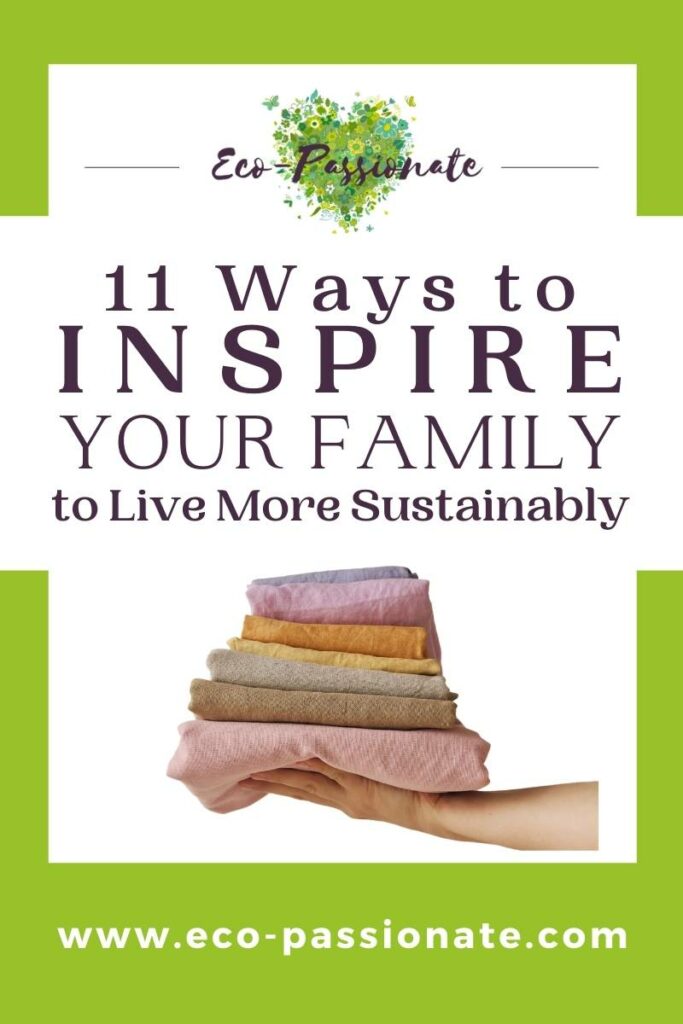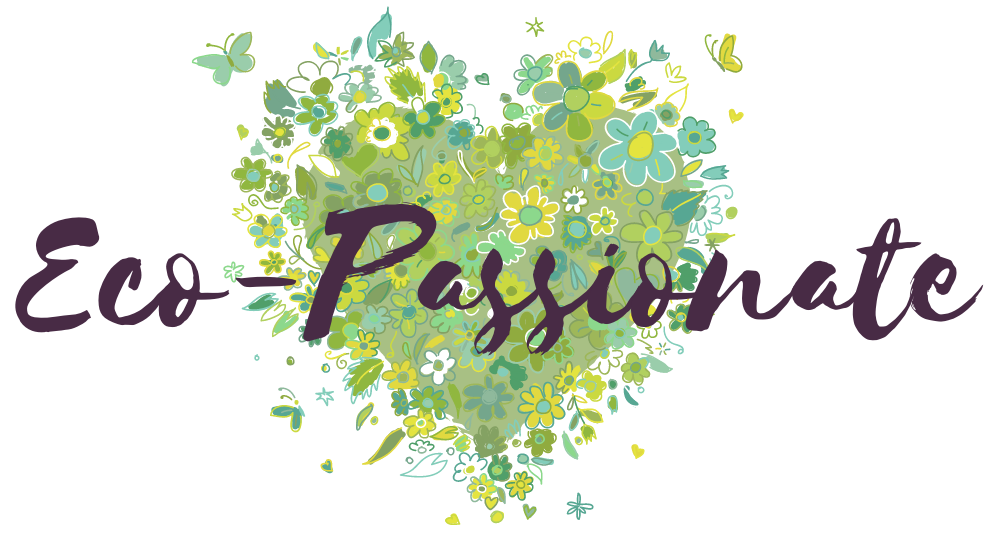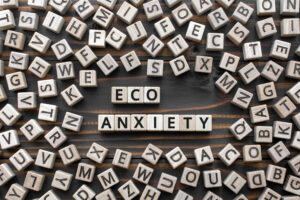What Inspires Environmental Educators to Keep Up the Good Fight? [Insights From My Own (Imperfectly) Eco-Passionate Life]
Have you ever wondered how so many people can go on living so wastefully, so blindly, so irresponsibly and so ignorantly? Even those who say they care about protecting nature go on living as though tomorrow will never come. One would think that this makes the job of an environmental educator insanely frustrating! Do you ever wonder how anyone could handle this level of frustration day after day, and what could possibly inspire them to keep going?
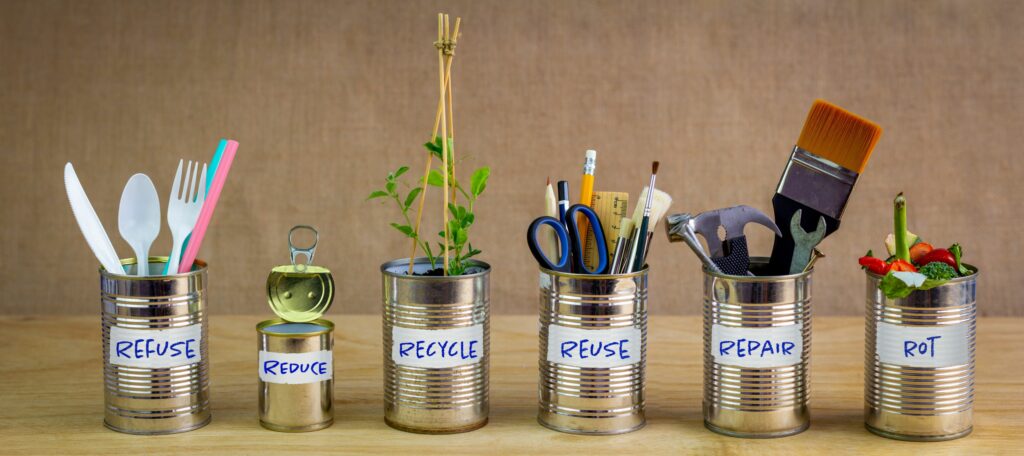
In my experience as an environmental educator, I have found that what truly inspires us is the belief in the power of education to ignite change, the awe-inspiring beauty and intricate interconnectedness of nature, and the pressing urgency of addressing environmental challenges for the sake of future generations. Just imagine what the world would be like if all children learned how to live sustainably by the age of eight, and were given the tools to do so! Things would most certainly look a lot different within the next 20 years.
We don’t have another 20 years to wait
Since we don’t have another 20 years to wait, we must ask ourselves the question: what stops the adults of today from taking action on environmental issues? Is it a lack of awareness, a lack of resources, or simply a lack of motivation? These questions often arise when discussing the barriers to environmental action and the ways in which environmental educators and others must approach finding solutions as well as how they address concerns.
What exactly do environmental educators do?
Inspire people to live less un-sustainably is what environmental educators do!
We environmental educators believe in the power of education to ignite change, appreciate the beauty and interconnectedness of nature, and recognize the urgency of addressing environmental challenges for the sake of future generations. But these challenges are not at all simple.
Through engaging and interactive teaching methods, environmental educators strive to raise awareness about environmental issues, empower individuals with knowledge and skills to make sustainable choices, and inspire action at both individual and collective levels. We understand that addressing environmental problems requires not only personal lifestyle changes, but also systemic and policy changes. By fostering a sense of responsibility and connection to the natural world, environmental educators aim to create a ripple effect of positive change, where individuals become ambassadors for sustainability in their communities and beyond.
Environmental educators are committed to fostering a sense of environmental stewardship and promoting a sustainable way of life. They work towards instilling a deep appreciation for the Earth and its resources, emphasizing the importance of conservation and preservation. We also aim to cultivate critical thinking and problem-solving skills, encouraging individuals to find innovative solutions to environmental challenges. By fostering a sense of empathy and interconnectedness, they hope to create a future where humans and the environment can thrive harmoniously.
Insights From My Own (Imperfectly) Eco-Passionate Lifestyle
For me, living eco-passionately means doing everything in my power to protect the natural world I love, including how I raise my children. That has also meant working in environmental education. And that in turn means, above all else, knowing how to inspire people to live more sustainably. That’s the whole point of the career. Obviously, it’s not a job for everyone, but it is nonethless immensely valuable and rewarding.
A career in environmental education means a career of reaching out to others in order to help them to re-connect with the natural world so that they might also understand what it really means to us (our life source), and that we need to live more sustainably in order to protect ourselves. Sounds simple, right? Not exactly.
The job of an environmental educator?
Early on, I didn’t yet know how to inspire people to live more sustainably and was pretty certain that I was heading instead for a career doing something else–anything, that would just pay a living wage. Can you relate?
Trade Secret: historically, environmental education ranks just behind ‘starving artist’ on the pay scale. Not that that stopped me! Blame it on competition? Hardly! There is no where near enough environmental educators out there to get the job done!
Despite how passionate I am about it, environmental education (also known as “EE”) is something I more or less just “fell into” without much thought of making it my career. I loved it from the get-go. For someone like me who grew up outdoors, a career in EE was an obvious choice. If you want to know the dirty details, read on!
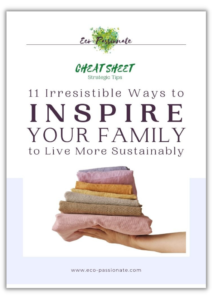
Get the FREE Cheat Sheet with the complete list of strategic tips in compact form!
Click the button below to opt-in
What inspired me?
It all started with a milk jug.
In my early twenties, I was really into recycling. I mean really into it. At the time my first child was still an infant (eh-hem, 30 years ago), I was still clueless as to what the mysterious numbers on all the plastics encoded, like milk jugs. Back then, I still had no idea they stood for chemical names PET, PE, HDPE, etc. I only cared that not all of it was getting recycled, and I needed to find out why.
Urban life was still new to me. Every so often, I wandered my pretty Brighton neighborhood and watched with interest as the blue bins were dutifully set out each week, filled with our discarded paper and co-mingled plastic, metal and glass, and then emptied into collection trucks. That was 1991, and I was living in Boston, one of the first cities to introduce curbside recycling in America. Would these bins replace the large dumpster at the food coop where I shopped and had been bringing all manner of discarded materials each week? What motivated people to use them?
What’s with the numbers?
“ONLY Plastics Numbers 1 and 2” were collected at curbside. The rest I took to the food coop myself. I had no other choice (besides the unthinkable). Besides, I was used it. I’d grown up way outside the city in what New Englanders call the “boonies”, where people still hauled their own trash to the landfill. Still, it puzzled me why the number should make such a difference. Why shouldn’t all the plastic get recycled? Where did the rest end up?
The truth was, most people didn’t care one way or the other. Trash collection was costing them money, while recycling was free. But, if the collectors saw that the blue bins contained items that didn’t belong, they would get left on the curb, unemptied. Aha!
I became passionate about recycling and wanted to understand why not all plastics were being collected. I immersed myself in the world of waste management, eager to uncover the truth behind plastics and recycling in general. As I delved deeper into the subject, I discovered the complexities of plastic composition and its impact on the environment. And much, much more.
Hobby or obsession?
Craving more knowledge, I’d visited landfills and incinerators around the state and sought opportunities to talk to recycling experts at several of the local colleges and universities and met with people who’d written books on the subject. I needed to find out the fate of the trash, and the recycled stuff. I hadn’t even started college, yet I was too restless not to find out all I could. That’s when I started to learn all about, not “waste management,” but “resource management” systems and professionals.
Was I obsessed? I’d rather say insatiably curious. I didn’t talk about it incessantly, but… let’s just say, I wasn’t often the first person to get invited to parties. You might say I had a slightly different idea of “fun” to most other people in those days. Exploring the layers of a city’s infrastructure became an exciting hobby of mine. Well, to me it was exciting.
The deeper value of stuff
You might say it was in my blood. I blame my grandfather. He set examples by reusing virtually everything that passed through his hands or household. He’d even built and maintained an entire hunter’s camp, using discards and “junk” parts, including not only old doors and windows, but also differently colored glass bottles, tin cans and even some plastic. I was therefore trained early on to see the deeper value of “stuff”. In my family, gallon-size milk jugs were re-used for collecting things, everything from blueberries to cranberries, to worms, water and small fish. Some jugs were hung on wires where the wind would blow them around, making some noise, and scaring off birds before they ate up the seeds and sprouts planted in the garden.
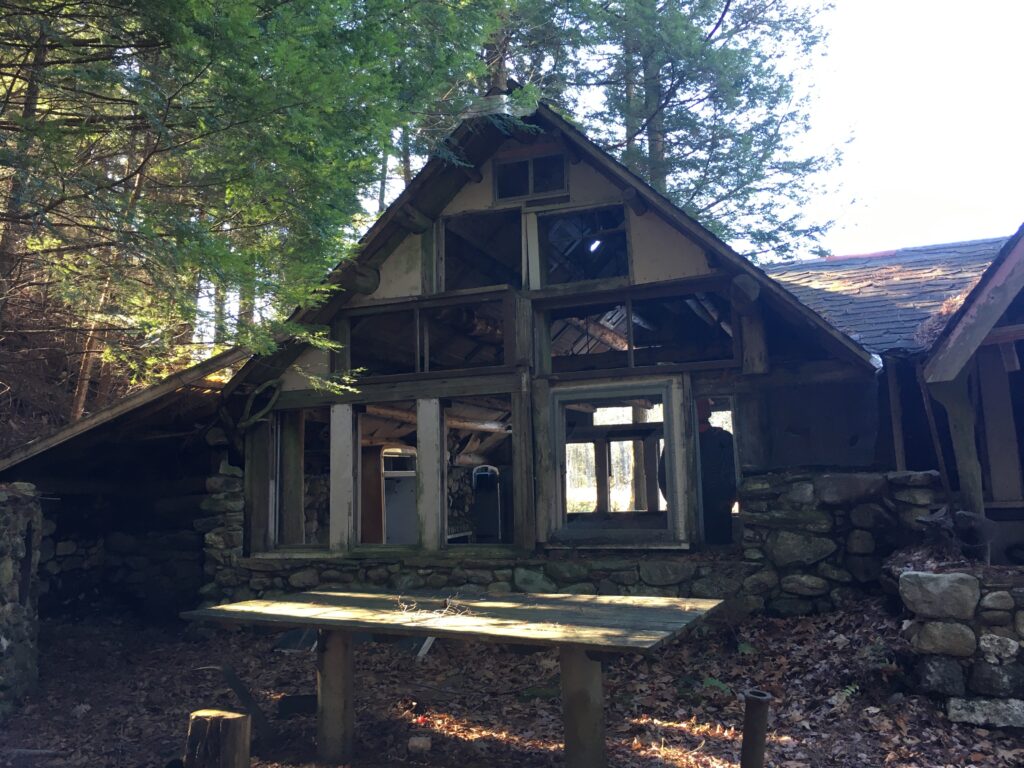
The explorations began to pay off
By the time I was 25, I’d explored a lot of municipal waste management and talked to a lot of people in my free time. One thing led to another and, while studying full-time, I’d landed a side job leading state-sponsored recycling education programs in public school classrooms all over eastern Massachusetts. And absolutely loved it!
I’d met a lady called Ann McGovern, who still coordinates the program to this day, and got paid by the state’s Department of Environmental Protection to organize and lead workshops of five types. In addition to “the great materials sorting game“, I also led:
- live (worm) composting workshops (inspecting the ecoystem with pocket microscopes),
- presentations on plastic- and sneaker-recycling (products made out of unexpectedly recycled materials)
- paper-recycling by hand (making new paper out of old homework pages, for example), and,
- with older school groups, discussions of landfills and groundwater/filtrate experiments.
Enthusiasm is infectious.
While I was doing presentations, I was so happy to be “playing” with the kids in the schools and watching their attitudes transform from “who gives a crap about this stuff” to “hey, I never thought recycling would be so much fun“, that it hardly ever felt like work. Did I care that the pay was abysmal considering the amount of time and energy invested? I was poorer than a church mouse, scraping by on student loans, had not a soul to support me, and yet I was so full of idealism that I couldn’t care less. Half-way through college (I’d been a late starter), I was already hopelessly in-love with teaching recycling, etc. to school kids (and teachers). It wasn’t until later that I’d started to feel the intense pressure of my own financial obligations. This had been just the beginning of a long journey.
An endlessly continuing education
From then on, I would visit every recycling-related talk or workshop I heard about, read every book that had to do with the economics of recycling, resource management and materials science that I could get my hands on, plus absorbed what I could on more general topics, such as the nature of economies, the economy of nature, population politics and developing economies.
As an educator, knowledge was my greatest asset. Or so I had thought. How else would I inspire others to live sustainably?
Today the list of such books and film documentaries is far longer. Be on the look out in my newsletters for my top recommendations (see also the resources at the end of this post).

Get the FREE Cheat Sheet with the complete list of strategic tips in compact form!
Click the button below to opt-in
What difference did it make?
Of course, none of what I was doing mattered unless my efforts were actually making a difference in the world. In other words, was I able to inspire others to live more sustainably? And that was the feeling that I desperately needed to have. That is why it simply wasn’t possible to stop or be satisfied with any other career. And why it never will be. Too many people still were not onboard, and too many today still don’t quite get it.
ture can teach you nature. Only wildlife can teach you about wildlife. Like learning a language or culture, one can only truly learn about nature and wildlife by being immersed in it, and by developing a personal relationship with it.
How to Inspire People to Live More Sustainably
If you are indeed totally frustrated with trying to convince certain others, and you’re struggling to get them to change their ways and help protect environmental and human health, then this is the most important section to read.
5 Suggestions on How to Inspire People to Live More Sustainably:
- Find out what motivates them.
- Respect the value of habits.
- Keep doing your own thing.
- Avoid negativity but be authentic.
- Be honest with and kind to yourself.
- Get my free CHEAT SHEET for all 11 strategic tips, plus some more explanation on how and why these tactics work and subscribe to my newsletter for more exclusive tips and free resources.

Get the FREE Cheat Sheet and give your family some Eco-Inspiration!
Click the button below to opt-in
I warmly invite you to subscribe so that we can stay in touch and so that I know how I can best help you and serve our shared cause! Without bombarding you, I regularly send free resources, exclusive offers and offer direct, personal feedback to my subscribers, should they request it. The option to opt out again is given in every email, if you don’t feel it’s a good fit. And many shared rewards await those for whom it fits just right!
Best Advice for Environmental Educators
Three of my best college mentors helped me to recognize the three most important lessons of my entire education. These apply as much to this blog as any other educational program I’ve designed, as well as to any other area of education. They’ve even helped me to inspire people to live more sustainably.
- “you haven’t learned a thing until you’ve made a mistake” (that is, until you’ve made a mistake, you haven’t experimented enough).
- “the sciences are worth learning, even if you never practice science again”
- “encourage curiosity”
Summary
Your eco-passionate lifestyle can be a powerful inspiration to everyone around you, no matter how imperfect it is. The power lies in allowing others to see and feel your glowing aura of happiness and pride in achieving even the smallest changes that you have wanted to see in the world. Naturally, we should all start with ourselves and our own habits. Then, the results become your best tool for inspiring others!
Although there are many good ways to encourage and inspire other people to live more sustainably, change their habits and cultivate a more ecologically sustainable lifestyle. Unfortunately, there are also many bad tactics that tend to do more harm than good. If we’re not careful, we can be counter-productive, and end up having more stress on all sides. Then it’s back to mending fences again.
Download your free cheat sheet to give yourself a reminder of what you might better avoid doing!
In Conclusion
Your family life and homelife should be peaceful and joyful. If it isn’t, then I’d like to help you make it that way. It can take a lot of work to make peace and find harmony and then preserve it, but there’s hardly anything more worthwhile. No damaged relationship has ever helped to solve our climate and environmental problems. Hardships will come and go, ego-struggles will get in the way, but the opportunity to find ways to connect or reconnect will still be there, for as long as you want them to be.
In closing, I encourage you to experiment, to keep optimizing your own lifestyle and to keep glowing with pride in your accomplishments. Just please don’t give up!
Stay curious!

P.S.
Was this article helpful? If you need more ideas or some encouragement on how to inspire people to live more sustainably, please feel free to leave a comment below or write to me directly, if you prefer. I would be more than happy to listen and to offer any support I can! Know somone who could use this? Please share!
Other Helpful Resources:
Links to related posts from same site (open link in same window)
- Cheat Sheet: How to Inspire People to Live More Sustainably
- How Real Is Eco-Anxiety [Insights and Why I Do Things A Bit Differently]
Links to related posts from other sites (open in new window)
- NPR article on the power of habits.
- Charles Duhigg: The Power of Habit
- B.J. Fogg: Tiny Habits
- Gretchen Rubin – Better Than Before
- Steven Covey – The 7 Habits of Highly Effective Teens

Get the FREE Cheat Sheet with the complete list of strategic tips in compact form!
Click the button below to opt-in
End of Post
